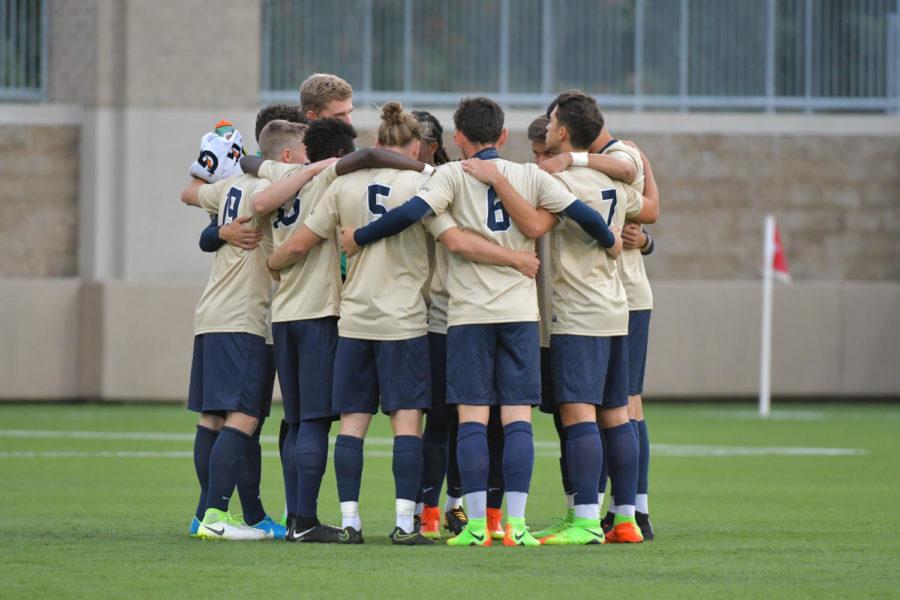The beginning of summer sounds like freedom for many Pitt students. But for student athletes, it is just the beginning of a long grind that will continue from now until the end of their season.
For the women’s volleyball and men’s soccer teams, there are a few athletes who will stay on campus throughout the entire summer, while others will play elsewhere. These athletes will work on staying in shape and improving their techniques, while managing injuries they may have picked up last season.
Coming back to the 2018-19 season with a strong roster is more important than ever for the volleyball team, which won its first ACC title in program history last year and reached the NCAA tournament for the second year in a row, where they lost to Penn State in the second round.
Dan Fisher, the team’s head coach, isn’t happy about not being able to coach his team during the summer due to NCAA rules that prohibit mandatory summer practices. Still, he sees value in many of his players going abroad to play for their country or even just playing volleyball in general.
“The training part’s great, but we really believe that learning how to compete is important too,” Fisher said. “Whether it’s playing internationally, whether it’s just even playing in a competitive open grass or sand tournament, I think that, for a young athlete, is really important.”
While most of the players are away from Pitt, there are about five or so who are still working out during the weekday mornings. If their schedules aren’t too crowded in the afternoon, they practice in the Fitzgerald Field House or even go to Highland Park to play in the sand courts there.
The majority of the team will be on campus after the first six weeks of summer for the team’s second six-week training session — and even though Fisher isn’t allowed to coach until the actual preseason begins August 10, rising redshirt junior Stephanie Williams doesn’t see this as a barrier to success.
“I think he’s made a culture where we care a lot all the time,” the outside hitter said. “Even though he’s not there and can’t correct us or yell at us, I think all of us will hold each other accountable … we just want to show him that we’ve actually gotten better and taken his advice.”
For those six weeks the majority of the team is there, they focus on six-on-six drills — a fast-paced, game-like environment that helps players improve speed, technique and communication, along with traditional exercise like weight lifting. Fisher said he has trained the players to mimic this in their workouts throughout the year.
“We’re trying to be quick twitch and in really good anaerobic shape. We do plyos, we do olympic lifting, we do circuit training,” Fisher said. “We do movements that kind of mimic the movements we do on the volleyball court as much as we can.”
While focusing on hammering technique and avoiding bad habits during the summer, the biggest challenge for the team is to remain focused on improving every day and not lower intensity throughout the summer, according to rising redshirt senior Angela Seman.
“I think in the summer sometimes it’s a little easy to slack and say, ‘I’ll just do more tomorrow,’” Seman said. “But I think this group of girls that we have, they’re really determined to taking care of business this summer and really working and that every day counts and pushing ourselves to be better than we’ve ever been coming into preseason.”
Like the women’s volleyball team, men’s soccer isn’t allowed to practice with a coach until August 10.
To get experience on their own, most members of the team will go back home to play with their Premier Developmental League team — a minor-league complement to Major League Soccer — or back to their home country if they are an international player. Some players also stay on campus to take classes as well, meaning they are here for almost the entire summer.
Team captain, rising senior Javi Perez, said he doesn’t like having time off between seasons. After spending a majority of his life playing for Valencia CF in Spain, one of the best youth soccer academies in the country, Perez says that the time without head coach Jay Vidovich stunts team growth.
“You’re not able to grow as a player because you got less time with your coaches, you got all these restrictions that hurt you from getting better,” Perez said.
Even though there aren’t a great number of players that stay on campus throughout the whole summer, the ones that stay usually train every weekday. Vidovich and strength and conditioning coach Tyler Carpenter coordinated optional runs and training Mondays, Tuesdays and Thursdays, and the team cools down and recovers with yoga Wednesdays and Fridays.
Vidovich and Carpenter emphasize recovery and avoiding injuries in summer training, especially since they play on turf, which has been shown to have caused more injuries than grass does. Three players, including Perez, had complications with knee injuries and had ACL surgeries last year.
“We set up a running program for them to see if we can keep up with improving their numbers in terms of their speeds, their distances, their ability to repeat sprints at high levels, those types of things,” Vidovich said.
The players who are still on campus, like Perez and rising sophomore Edward Kizza, are focused on getting in shape before spending more time on the pitch with the soccer ball.
“Once we start getting into summer … we can focus more on ball work and stuff, passing the ball, movement,” Kizza said. “But then those other things like the drills we do, like some in the weight room, are gonna help us with explosiveness, change of pace, turning and stuff. Everything is a process for everything we want to work on during the preseason.”


